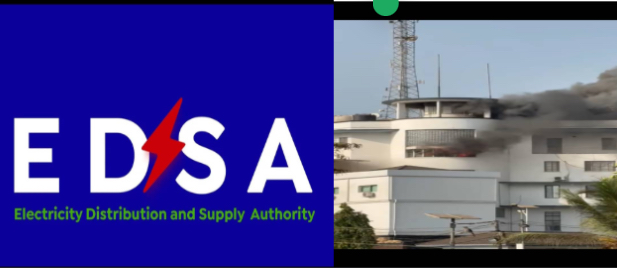By Ibrahim Alusine Kamara (Kamalo)
The Electricity Distribution and Supply Authority (EDSA) has once again come under fire—this time, quite literally—as the seat of power, State House, went up in flames on Saturday. The fire, which originated on the third floor and ravaged parts of the fourth, has been confirmed by both the Chief Fire Officer and the Minister of Information as being caused by electrical malfunction—an all-too-familiar phrase now synonymous with the authority.

This incident is not isolated. Just the first quarter of this year alone, Sierra Leone has witnessed over 200 fire outbreaks nationwide—many of them devastating, leaving behind trails of ash, loss, and trauma. These incidents, most of which are reportedly linked to the erratic, unstable electricity supply by EDSA, have gutted homes, businesses, schools, and now, the symbolic heart of the nation’s governance.
Despite repeated warnings and growing public outcry over the persistent and poorly managed power surges and outages, the government has been alarmingly silent—offering no comprehensive audit of EDSA’s operations, no public safety reforms, and no accountability measures. Citizens have taken to radio stations, social media, and even the streets to raise alarm, but their cries have largely fallen on deaf ears.
The fire at State House could have been the fire at any ordinary Sierra Leonean’s home. In fact, for hundreds of families across the country, it already has been. From the densely populated neighborhoods of Freetown to rural districts across the provinces, the pattern has been chillingly consistent: a flicker of power, a sudden surge, a blaze.
Chief Fire Officer Nazir Ahmad Alie Kamanda Bongay, in an interview following the State House blaze, confirmed that preliminary investigations pointed to an electrical fault—echoing the cause of dozens of other recent fires. Minister of Information and Civic Education, Chernor Bah, during a live interview on AYV, corroborated the findings, stating that the fire resulted from a malfunctioning electrical appliance.
The government’s consistent failure to act decisively—despite being fully aware of the scale and source of the danger—has now led to national embarrassment and infrastructural loss at the very core of its operations. If EDSA’s systemic failures can engulf the President’s office, what safety net exists for the average citizen?
The State House fire should be a wake-up call—albeit a delayed one. The question that now hangs in the smoky air is simple but damning: How many more fires, how many more homes, how many more lives must be lost before the government acts?
As investigations continue, the people of Sierra Leone are watching—not just for answers, but for action. The time for reactive apologies is over. What the country needs now is accountability, reform, and a leadership willing to protect its people before the next spark ignites another national tragedy.
